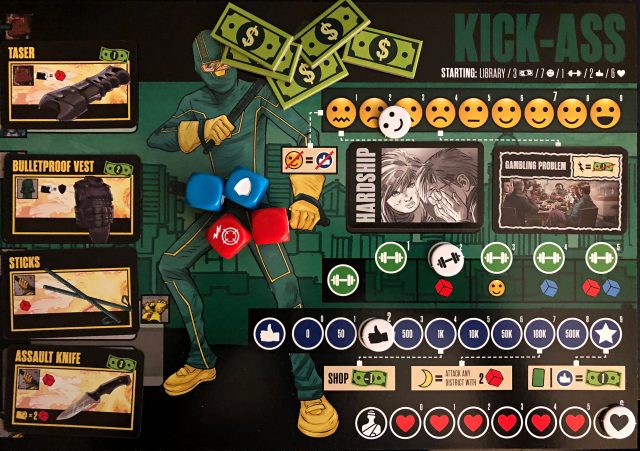Adapting an IP for tabletop is a daunting task. Which parts of the canon do you keep, and which must be jettisoned for the sake of gameplay? How do you preserve all the feels–the humour, the tension, the adrenalin-jolting WAAAARG? Do it right (Harry Potter: Hogwarts Battle) and both the IP nerds and tabletop geeks will love you. Do it wrong (Legendary Encounters: Firefly) and the browncoats and card-sleevers will be out for your blood.
 All of this goes doubly for niche or cult IP like Kick-Ass, Marvel’s 2008 comic which was made into one pretty decent and one pretty awful movie (ymmv). In my mind Kick-Ass was an NFSW update of the themes of Spider-Man: a teenager blunders into vigilante heroism and struggles to maintain a balance between quotidian adolescent life and violent crime-fighting in the social-media era.
All of this goes doubly for niche or cult IP like Kick-Ass, Marvel’s 2008 comic which was made into one pretty decent and one pretty awful movie (ymmv). In my mind Kick-Ass was an NFSW update of the themes of Spider-Man: a teenager blunders into vigilante heroism and struggles to maintain a balance between quotidian adolescent life and violent crime-fighting in the social-media era.
The popularity of the comic and movies clearly motivated CMON to bring out a board game version (hey, it takes a lot of money to produce mini-heavy boardgames). Back in August Sean wrote a preview that took you through the gameflow and mechanics. Now that the game has hit stores I want to write about how the game tackled translating the world of Kick-Ass into tabletop form.
The credits list neophytes Roberto Pestrin and Mauricio Vergendo along with the slightly more experienced Hjalmar Hach (Photosynthesis, Dragon Castle, Railroad Ink) as main designers, along with no less than six other people for “additional design and development”, many of whom appear to have worked together on The World of SMOG. It takes a village, they say…
Does this design-by-committee carry it off? Basically: yes, with a couple of provisos.
 In case you missed Sean’s article, Kick-Ass: TBG basically follows the co-op template: there’s a Boss you have to beat to win the game, but you can’t fight him until you deal with at least three “Events”. Each turn bad stuff happens first and then you and your comrades race around NYC spiking minions and mini-bosses and trying to complete Events using your unique Action decks (a deckbuildy mechanic that is Mage Knight-lite-lite).
In case you missed Sean’s article, Kick-Ass: TBG basically follows the co-op template: there’s a Boss you have to beat to win the game, but you can’t fight him until you deal with at least three “Events”. Each turn bad stuff happens first and then you and your comrades race around NYC spiking minions and mini-bosses and trying to complete Events using your unique Action decks (a deckbuildy mechanic that is Mage Knight-lite-lite).
As a hero you have to balance your daytime living as a teenager in the Big Apple with your nighttime activities as a friendly neighbourhood somewhat blood-lusted vigilante. In other words, you’re often forced to choose between fight-power, personal happiness, and social media likes. The stronger, happier, and more popular you are, the more special abilities you get. On the other hand, get too unhappy and “hardship” cards activate, penalizing you in some way. Just like real life!
Each section of the city has its own ability you can activate as well, and as usual in a co-op game part of the frustration (erm, fun) is coordinating who goes where and does what on their turn. Unfortunately, Kick-Ass: TBG doesn’t have any mechanisms to prevent the “Pandemic Syndrome” whereby one bossy-boots can basically play the game solo by telling everyone what to do. That’s Proviso #1.
The game has plenty of replayability. The Event deck is large enough that you can be sure never to see the same sequence of challenges twice, and each boss plays differently. Red Mist is the easiest, but still requires you to track down his hiding place and has some nasty Final Plot effects. Taking down Don Genovese requires you to go around to various gangs and either bribe them, report them to police, or loot their hideouts before taking him and his Minions on.
 As one would expect from CMON the components are top-notch and the rules, while a little disorganized–the crucial Reference Guide to icons is buried mid-rules on page 24–are clear and comprehensive. Their decision to weave comics through the rulebook gets points for theme and meta, but does get to be a pain when you’re flipping around trying to find the right rule.
As one would expect from CMON the components are top-notch and the rules, while a little disorganized–the crucial Reference Guide to icons is buried mid-rules on page 24–are clear and comprehensive. Their decision to weave comics through the rulebook gets points for theme and meta, but does get to be a pain when you’re flipping around trying to find the right rule.
There’s a fair bit of cuss words, violence, and NFSW material in the game, and anyone who buys it expecting anything else deserves not to get their money back.
All in all Kick-Ass: TBG does a good job of recreating the atmosphere of its source–but at the price of some complexity. The game is at least one step up from Pandemic and casual or new tabletoppers will find it hard to learn and play, in my opinion; that is Proviso #2.
On the other hand, veterans of co-op games who are also fans or admirers of Kick-Ass will find it an enjoyable evening of mayhem.
awesome